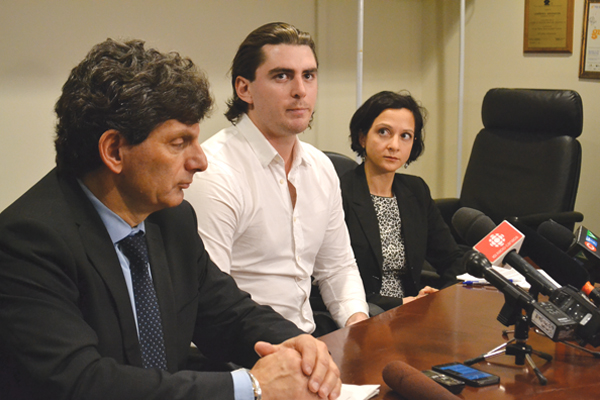Media outlets are finally starting to do women’s sports justice
In the week after Caitlin Clark and Iowa took down the LSU Tigers during the NCAA Women’s March Madness Elite Eight, I heard two of my friends say how much they “hate” Angel Reese. It annoyed me both times, and their bitter sentiments stuck with me.
The day after, I still couldn’t get it off my mind. Ignoring what seemed to me like casual racism — considering I heard no similar qualms about other players — Reese is a 21-year-old college student who likely lives a life on campus not dissimilar from me and my friends — sans the whole averaging 18 points and 13 rebounds a game in the NCAA part. She’s a kid playing basketball for the love of the game.
But the fact that I even heard Reese’s name was a change. It’s been a long journey for women’s sports, so the sheer fact that it’s even a topic of conversation is a good thing. Clark is doing a lot of lifting on that front as she drives the hype behind this year’s tournament, but in general women’s sports are growing exponentially.
12 million viewers tuned in to watch her Hawkeyes take down Reese’s Tigers. That Elite Eight matchup drew more viewers than any game from the MLB World Series, NBA Finals, or Stanley Cup Finals game from last season.
Take a minute to think about that. That means that it is more likely for someone to have witnessed Clark and Reese duel than to have seen Corey Seager’s three home runs during the 2023 World Series, the Vegas Golden Knights setting a record for goals in a cup clinching game (nine) during the 2023 Stanley Cup Finals, or Nikola Jokic leading the Denver Nuggets to their first Larry O’Brien Trophy.
Back to Reese. While my friends are obviously entitled to their — wrong — opinions, the people who take it a step further are obviously not. “I’ve been through so much,” said Reese in a postgame interview after that Iowa-LSU game.
“I’ve seen so much. I’ve been attacked so many times. Death threats, I’ve been sexualized, I’ve been threatened,” continued the outgoing LSU forward while battling back tears. It’s almost impossible to watch the interview and not feel for Reese if you have a shred of basic empathy.
So what did Reese do to receive all this hate? Last year, it was Reese and the Tigers who got the upper hand on Clark and the Hawkeyes — that time in the national championship. With the game winding down, Reese hit Clark with the John Cena ‘you can’t see me’ move, and then pointed to her ring finger, signifying the championship ring she was about to place on it.
More generally, she just shares a propensity of trash talk that any athlete familiar with competitive team sports has seen and heard from countless teammates and opponents over the years. Speaking to CBS before the rematch this year, CBS Baltimore spoke to Reese, Clark, and LSU guard Hailey Van Lith about the trash talk.
“I don’t think people realize it’s not personal,” explained Reese. ” Once we get out from between those lines, if I see you walking down the street, it’s like, ‘Hey, girl, what’s up? let’s hang out.’ I think people just take it like we hate each other. Me and Caitlin Clark don’t hate each other. I want everybody to understand that. It’s just a super competitive game.”
LSU guard Hailey Van Lith told CBS “It’s a part of why people want to watch the game,” she said. “I think, when you think about hockey and the fights, people like to see that. That’s not why we do it. It’s our personalities. It’s what makes the game fun for us.”
But it’s not just fans bashing Reese. Multiple analysts, podcasters, and people in the sphere of sports media have commented on the situation, feeding into fans’ delusions. Keith Olbermann — renowned for his infamous sports takes — called Reese a “fucking idiot” after last year’s game. CBS’s Danny Kanell called it “classless” on Twitter — which led to users responding with a video of Clark doing the exact same move back to Reese.
With more visibility, comes more hate. Former NHL player Bobby Ryan’s negative comments about the tournament from April 1 on Twitter revealed that we still have a ways to go — even among diehard sports fans — until women’s sports can escape from baseless criticisms.
And it’s not just men in the sphere of sports media who are disrespecting these talented athletes. I’d be remiss if I didn’t mention the comments of current and former Women’s National Basketball Association (WNBA) players directed at players like Clark and Reese.
There seems to be a certain amount of jealousy directed towards the current wave of young talent in the NCAA from the old guard. Hall of Famer Lynette Woodward went so far as to incorrectly claim that Clark didn’t actually break her NCAA scoring record, even after the Hawkeyes went out of their way to honour the former record holder when Clark broke it in February.
“I just want to make sure that we acknowledge [Woodward]’s accomplishments in the game of basketball,” Iowa coach Lisa Bluder said at the time, due to the fact that the NCAA doesn’t recognize Woodward’s record as it was pre-1982.
To her credit, Woodward later walked back her remarks, saying in an Instagram post that “no one respects Caitlin Clark’s accomplishments more than I do,” and later stating clearly that “Caitlin holds the scoring record.”
But for reference, when Lebron broke Kareem Abdul-Jabbar’s long standing NBA points record in February of 2023, the Hall-of-Famer was nothing if not enthused. “It’s as if I won a billion dollars in a lottery and 39 years later someone won two billion dollars,” said the retired great in a Substack post. “How [do] I feel? Grateful that I won and happy that the next person also won. His winning in no way affects my winning.”
Breanna Stewart — who played with 12 future WNBA players at perennial powerhouse University of Connecticut enroute to four straight national championships — alleged on April 5 that Clark needed a championship to be considered one of the greats in women’s college basketball history.
Nice try, Breanna. Before Clark, the Hawkeyes had played in just one Final Four and zero national championship games. Before Stewart? The Huskies made 13 Final Fours and won seven national championships. Bit rich, don’t you think?
From 529 game WNBA veteran and American national team mainstay Diana Taurasi on this crop of players entering the league next year: “Reality is coming… …You look superhuman playing against some 18-year-olds but you’re going to come play with some grown women that have been playing professional basketball for a long time.”
Is there going to be an adjustment period? No doubt, Taurasi. No one is saying Clark will average almost 32 points per game or Reese 13 rebounds per game in the WNBA next year. Although, phenoms like James, Alex Ovechkin, Sidney Crosby, Connor McDavid, and even Candace Parker (who won an MVP in her rookie WNBA season!) have dominated the second they stepped into the professional atmosphere, so there is even precedent. But I think that this old guard is having a tough time accepting that the game is just simply bigger than it was when they were in college.
I feel for them. It’s tough being trailblazers and not getting the respect you deserve only to see the next generation receive that respect. But to publicly dig at future greats like Clark is going to come back and make them look really, really ignorant.
On that note, while traditional media is giving women’s sports coverage, some have proposed that they may not be covering it in the best manner. Jessica Smetana said it best during an appearance on The Dan Le Batard show on April 4.
“I think the thing that is a little bit of a double-edged sword right now with where we’re at with women’s sports is that obviously, if you’re a fan of women’s sports, you want them to be treated the way that they should be treated, which is a huge event, that is covered on mainstream shows, on all the networks.”
But Smetana noted that the media environment around men’s sports is not any less toxic. “Seeing some of the conversations happening on ESPN or Fox or whatever, it’s disheartening because you now see the way men’s sports is treated a lot of the time, which is like, really ignorant, just stupid hot takes.
But now it’s happening to women’s players, and I think there’s an element of racism and definitely sexism that a lot of these shows do not know how to talk about, and do not know how to handle.”
Smetana went on to talk about how amazing it is that we are finally talking about these sports, but instead of elevating the journalists who have been covering these events the entire time, we are now simply hearing and seeing the ‘talking heads’ on these major networks who say inflammatory things simply to get clicks and views.
Unfortunately, with greater visibility for women’s sports comes more contrived lunacy from these sapheads like Stephan A. Smith, Kendrick Perkins, or Skip Bayless. These talking heads exist — and are given a large platform on these networks — to spew purposefully provocative takes in an effort to get their soundbites shared around social media.
But moving on, about that visibility. I’m not one of those numbnuts who think that the NCAA Women’s March Madness just suddenly started being entertaining, or that the PWHL is the first women’s hockey league. That would take some awfully tricky mental gymnastics.
Is it getting more entertaining? In my opinion, yes, but obviously, the talent has been there for quite some time — though it took a major shift in the media landscape to push these leagues to the forefront.
Growing up, I was a kid who would watch any sport that was on the television. Obviously, in Ontario, that included the NHL, Toronto Blue Jays, Toronto Raptors, and the NFL. But it wasn’t just the big leagues I paid attention to.
Whether it be Friday Night CFL Football, STIHL Timbersports at 12:30 p.m. weekdays, or a random Saturday morning Premier League match, if it was on The Sports Network (TSN), I was watching. And of course, not just the games, but the highlights.
Like many Canadian kids my age, I was raised partially by Jay Onrait and Dan O’Toole, the colourful late-night Sportscentre hosts whose broadcasts were rerun throughout the following day. And if Jay and Dan were talking about it, I was interested.
So while I have some memories of watching players like Caroline Ouellete and Meghan Agosta star for the Canadiennes de Montreal of the Canadian Women’s Hockey League (CWHL), they’re few and far between.
That’s because Sportsnet — TSN’s rival — broadcasted a paltry number of games — a total of just three in 2018. And I’m not entirely placing the blame on Sportsnet or saying that TSN would have done better with the media rights.
The CWHL couldn’t even afford to stream their own games that season, managing to broadcast just 18-of-80. And if no one was broadcasting them, that doesn’t just mean no games — it means no highlight tapes.
Flash forward ten years, to 2024. Every PWHL game from their inaugural season has been or is scheduled to be broadcast on one of TSN, Sportsnet, or CBC, in simulcast with a French language station and one of several American stations. The league also streams each game on its YouTube channel, for those of us who have cut cords.
Beyond the broadcasts, outlets like TSN and Sportsnet cover the PWHL on their Instagram and Twitter pages. Along with inclusion on TSN’s SportsCentre and Sportsnet’s Sportsnet Central, that makes it so even if you don’t have time to watch many games, it is still easy to follow the league.
That buy-in is something we just haven’t seen from media entities until recently. And again, it’s not just broadcasting the games. The entire ecosystem supporting the league provides fans and potential fans with interesting storylines, making the games much more interesting for more casual fans.
According to Forbes, media coverage of women’s sports has nearly tripled in the past five years. With new pro leagues like Project 8’s Canadian women’s pro soccer on the near horizon and the media ecosystem in place, that figure is only going to grow.
There’s going to be growing pains. But ultimately, we’re on the right path. For fans, it’s becoming more and more accessible to keep up with women’s sports. And for the players, it’s not just a hobby or part-time job anymore — they’re starting to be paid like the world-class athletes they are.
And as Caitlin Clark checked out of the national championship with 20 seconds remaining down 12 points to the undefeated South Carolina Gamecocks, I couldn’t help but think that the number 22 Iowa jersey she wore for four seasons will eventually go down in history — like Michael Jordan’s number 23 Tar Heels jersey, James’ number 23 Irish jersey, and Kobe Bryant’s number 33 Lower Merion jersey before hers.






